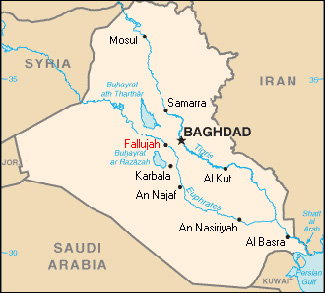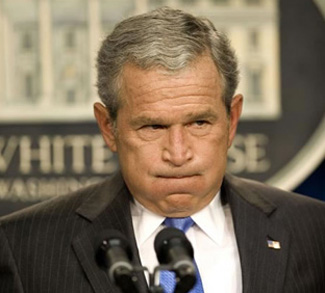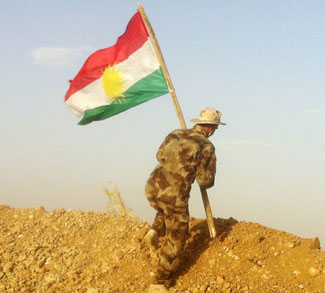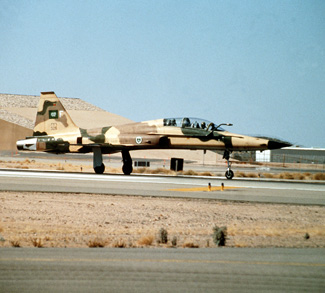Since the New Year, Iraq’s Anbar province has been wracked with violence as tribal militias, Iraqi government forces, and the al-Qaeda inspired Islamic State of Iraq and the Levant (ISIS) have fought for control of key cities in the region.
Though the causes behind this current round of violence are multi-faceted, its outbreak can roughly be traced to December 28, when Iraqi Prime Minister Nouri al-Maliki dispatched troops to Ramadi to arrest Ahmed al-Alwani, an MP in the Iraqi Parliament.
Al-Alwani is a Sunni politician with ties to an Anbar-based protest movement against the al-Malaki government, which protesters accuse of unfairly targeting its Sunni political opponents. The movement has decried the mass imprisonment of political prisoners, suspect executions under Iraq’s controversial Article 4 of the Terror Law, and Sunni expulsions at the hands of government-sanctioned militias. Al-Alwani acted as the group’s voice in parliament, and it follows that he was likely targeted in an effort to stem criticism towards what many Sunnis believe to be an increasingly authoritarian and sectarian prime minister.
These events corresponded with a substantial increase in activity from the Anbar-based ISIS – an al-Qaeda affiliated militant group formed during the US occupation of Iraq. Owing to its involvement in the Syrian civil war, recruitment and funding have spiked through 2013, allowing it to carry out more sophisticated bombing campaigns in Baghdad and Shiite strongholds in Iraq.
As military presence was stepped up in Anbar in response to Sunni protests, ISIS seized an opportunity to carry out a string of ambushes and attacks on army patrols, notably on December 21 when an ISIS attack killed the commander of the 7th Iraqi Army Division, along with 23 other officers. This incident served as a pretence for the Iraqi government’s late December military operation, which was ostensibly aimed at driving al-Qaeda from the west of the province.
However, Prime Minister al-Maliki, unable to resist the temptation to tackle other political problems, branded the Ramadi protest camp an ISIS base, dispatching the heavily-armed Iraqi security services to force it to disband. Tribal leaders supporting the protest movement, such as Sheikh al-Saadi, had already warned Maliki that any government attempt to clear the camp would be met by force of arms.
It was in this context that the arrest of al-Alwani was announced.
During the crisis that followed, ISIS – adopting the usual al-Qaeda modus operandi of exploiting local grievances – seized control of Fallujah, claiming it would “defend Sunnis from the government.” Tribal partisans took the eastern Fallujah army base in a nearly simultaneous attack, which suggests some degree of coordination with ISIS (though tribal forces allowed the military to withdraw and declined to engage with police units in stark contrast to the ruthlessness displayed by ISIS).
ISIS’ bloody reputation helps explain why in Ramadi, despite ongoing tensions over the handling of the protest camp, tribal authorities have largely cooperated with government forces against ISIS gunmen in clashes around the city centre. In particular, Mohammed al-Hayes, leader of the Awakening Council and a vocal ally of al-Maliki, was able to establish a dialogue with tribal leaders to coordinate a joint response against ISIS forces in the area.
Violence has spread across Iraq against the backdrop of the Anbar crisis, with Mosul and Kirkuk experiencing recent attacks, some involving multiple car bombings and army units being ambushed. There have also been execution-style killings reported in the Shiite areas of Baghdad.
Fallujah is still under ISIS control, though the near-constant fighting within the city suggests that this control is being disputed. Any goodwill between ISIS and local tribes seems to have been exhausted by the former’s attempt to create a force to police local religious matters. The Iraqi army has cordoned off the city, launching the occasional artillery strike, but it does not appear to be preparing any operation to re-take it at present. Iraqi military planners are well aware that Fallujah will prove more of a strategic challenge than Ramadi given the stronger ISIS presence in and around the city.
ISIS is also attempting to push outwards, organizing a campaign to isolate the army by cutting off supply routes, blowing up bridges, and trying to seize Saqlawiyah. ISIS gunmen have also launched attacks on eastern Ramadi, and are reportedly holding on to some districts.
Although it seems for the time being that most local tribes are willing to work with the Iraqi central government in expelling al-Qaeda elements from the region, this should not be taken as evidence that underlying sectarian tensions have been resolved. Tribal cooperation is being extended with the expectation of future concessions such as the release of political prisoners and a more accommodating policy towards Iraq’s Sunnis. Whether or not these promises are delivered on will dictate the future tone of sectarian relations in the region.
Ongoing support from local tribes is critical to any military effort, just as it was during the Anbar Awakening. The Iraqi military cannot hope to hold the province without local assistance. Furthermore, it was only with tribal tolerance and assistance that ISIS managed to seize any of the cities in the region, so keeping tribal forces aligned with the Iraqi army is critical moving forward. Unfortunately, this is not guaranteed given the sectarian nature of the Iraqi army with its largely Shiite recruits. Divisions between different tribal leaders will also complicate matters, as some are unwilling to work with the others. These are divisions that ISIS will doubtlessly try to exploit.
The greatest risk at the moment is that the focus on Anbar and Fallujah is tying up Iraqi military resources, giving ISIS a freer hand in other parts of Iraq. As recent history has shown, ISIS is very capable of operating within the capital and in predominantly Shiite areas. The other major concern is that if the government and tribal militias split again, then Anbar could become a sanctuary for ISIS forces fighting in Syria, giving them the upper hand in their conflict against the Islamic Front.
There is an additional concern that, even if the loyalists triumph in Anbar, the pattern is set for sectarian militias playing a predominant role in Iraqi politics at the expense of a representative and unified state. Such a system of governing is unstable and prone to violence, especially given the wider regional dynamics at work. Maliki could always seize the initiative and create a more representative military force, but unfortunately history does not give us much cause for hope.




